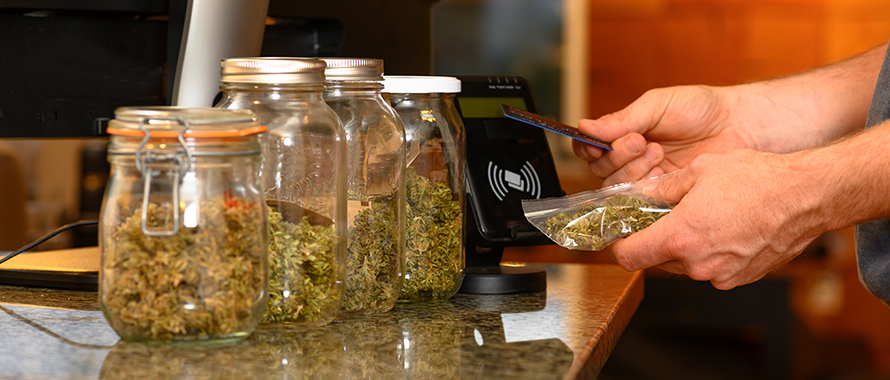Colorado, Illinois and Ohio set new records for monthly marijuana sales in July and August, underscoring the resilience of the cannabis industry amid the COVID-19 recession.
In July, recreational and medical marijuana stores in Colorado generated a combined $226.4 million in revenue, up 13.8 percent from June, and Ohio saw a record $21 million in medical marijuana sales. In August, Illinois recreational cannabis store sales reached nearly $64 million, surpassing the state’s previous record from July by more than $3 million.
The new figures reflect continued growth of marijuana retail sales in the U.S., projected in June to surpass $15 billion by the end of 2020 and soar to as much as $37 billion by 2024.1 The cannabis industry also remains strong in Canada, where July retail sales exceeded $231 million,2 an increase of 116 percent3 over last year.
“Cannabis is expanding, even when a lot of businesses are seeing a downturn in sales,” said Emily McDaniel, Broker, Commercial Insurance, Burns & Wilcox, Denver, Colorado. “Some industries’ sales were hit hard by the global pandemic; cannabis has not experienced that same impact.”
While recalls are ultimately a safeguard for consumers and a sign that governing bodies are responding quickly when a product is mislabeled or unsafe, the costs to growers, manufacturers and distributors can be significant.
Nevertheless, the industry faces challenges during the pandemic and businesses are at risk for a range of potential liabilities. Cannabis Insurance is a fundamental part of protecting these companies. Essential Cannabis Insurance policy types include Product Recall Insurance, Commercial General Liability (CGL) Insurance, Product Liability Insurance and Commercial Property Insurance, along with others, such as Excess Liability Insurance.
Cannabis recalls safeguard consumers, add business expense
Product recalls are a common risk faced by cannabis businesses. Cannamedical, a German medical marijuana company, recently recalled a batch of cannabis flower imported from Canada found to have contamination above acceptable levels. The September 15 recall was the third of its kind in Germany this summer; it applied to certain products imported from Canada and sold to pharmacies between July 21 and August 29.
“It is not unusual to have a recall involving cannabis,” said Allison Sinha, Senior Underwriter, Property & Casualty, Burns & Wilcox, Toronto, Ontario. “While recalls are ultimately a safeguard for consumers and a sign that governing bodies are responding quickly when a product is mislabeled or unsafe, the costs to growers, manufacturers and distributors can be significant.”
Product Recall Insurance is a chief component of Cannabis Insurance coverage in Canada, helping companies with costs related to recalling and destroying affected products, conducting required testing, and hiring consultants to assist in the recall process.
Proper risk transfer may not always be top of mind for companies, but it is a crucial part of protecting their assets.
Without Product Recall Insurance, a company could be left with expenses totaling several hundred thousand or several million, Sinha said. “Those figures do not include business interruption from being unable to sell a product,” she added, stressing the importance of including business interruption coverage in a Product Recall Insurance policy. “It is vital to protect your balance sheet and your shareholders by making sure you can continue to do business as usual.” McDaniel agreed: “The expense of a recall can be astronomical; it can wreck a company.”
Product Recall Insurance options have recently expanded in the U.S., allowing cannabis companies to purchase standalone policies to help protect themselves against this risk. “The standalone policy option has been limited in the past,” McDaniel said.
Cannabis companies can also mitigate the risk of a recall by implementing proper risk management procedures, including product testing to catch contamination, and having an attorney review company contracts. “Proper risk transfer may not always be top of mind for companies, but it is a crucial part of protecting their assets,” added McDaniel.
Overseas exports expand prospects, risks
Canada is a leader in the cannabis industry, Sinha said, and other countries are increasingly seeking to import Canadian products. As cannabis producers expand outside of the country, navigating new regulatory bodies presents some challenges.
“Canadian companies are well versed in Health Canada’s regulations and requirements, but lack of familiarity with other national or international regulations can result in unexpected incidents and expenses,” Sinha said. “If a company is not prepared for pretty much any scenario, one incident could be financially devastating.”
To help them navigate a recall, companies operating internationally can take advantage of expert consultant services included in Product Recall Insurance policies through certain carriers. Burns & Wilcox consultants operate in numerous countries around the globe and are available to help a company respond quickly and efficiently to a recall.
While recalls are ultimately a safeguard for consumers and a sign that governing bodies are responding quickly when a product is mislabeled or unsafe, the costs to growers, manufacturers and distributors can be significant.
“Regardless of where a recall takes place, a company with one of our Product Recall Insurance policies in place has the security of knowing we have their back,” Sinha said. “If you do not have boots on the ground in another country, it can be difficult to send an employee there to troubleshoot when something goes wrong, especially during COVID-19.”
Companies shipping their product overseas need to be certain their Cannabis Insurance extends outside their home country. “Not all Cannabis Insurance policies include coverage for product recalls that take place in other countries,” Sinha noted. “Companies should review their policies and verify they have coverage in any territories in which they are selling cannabis.”
Extreme weather, rapid business growth common hazards
Beyond product recalls, cannabis companies face other risks as they operate in a rapidly changing industry.4
From companies that are partnering with distilleries to produce hand sanitizer5 to those expanding their operations to meet increased demand, a thorough review of Cannabis Insurance is warranted. CGL and Product Liability Insurance in particular should be regularly reviewed to verify coverage to mitigate costs related to a product that causes—or is alleged to have caused—bodily injury. If a cannabis company’s increased sales lead to hiring additional staff, Employment Practices Liability Insurance (EPLI) and Directors and Officers (D&O) Insurance may also need to be updated.
“There are not as many new marijuana businesses opening this year, but existing businesses’ sales are up; they are expanding their operations and building new grow facilities,” McDaniel said.
Commercial Property Insurance is a key consideration, particularly given an increase in severe weather events.6 When an early September cold snap hit Colorado this year, the unanticipated freeze put marijuana and hemp growers at risk for millions of dollars in losses.7
Coverage to help with losses stemming from crop damage could be included in a Cannabis Insurance policy, depending on how the policy is structured, McDaniel said. Wildfires present another risk to cannabis businesses, with some growers recently discussing ways to operate amid the “new normal” of recurring wildfires.8 Commercial Property Insurance can help with costs related to damaged structures as well as lost plants or inventory, McDaniel said.
Proper risk transfer may not always be top of mind for companies, but it is a crucial part of protecting their assets.
Cannabis businesses altering operations in any way should check in with their insurance broker or agent about their coverage needs. “Individuals in this business are often very entrepreneurial, and they are why this industry is where it is today,” McDaniel said. “The best way for a company to be both safe and nimble is to remain in close contact with its insurance broker about changes to its business or operations.”
Although cannabis sales are growing, the Cannabis Insurance market is hardening and new exclusions are being added to policies, McDaniel pointed out. Insurance policies are available to meet the needs of a range of companies from small startups to large corporations; however, an experienced broker is needed to help match a business with the right coverages. “If you do not already have an insurance broker who knows the cannabis space, take the time to find a specialist who will partner with you,” said McDaniel.
Staying in touch with its insurance broker can also help safeguard a company from an unexpected, large audit and subsequent bill in the event its sales have surpassed expectations, McDaniel said. “Mid-term or throughout the policy period, if a company experiences a large influx in sales, they should have a conversation with their broker,” she said.
“Having that conversation or check-in could help prevent potential holes or gaps in a company’s coverage,” Sinha added. “The cannabis industry is evolving rapidly, so a broker who truly understands Cannabis Insurance and the industry is invaluable—when a company goes through changes, an expert broker is one step ahead.”
Sources: 1 McVey, Eli. “Exclusive: US retail marijuana sales on pace to rise 40% in 2020, near $37 billion by 2024.” Marijuana Business Daily, June 30, 2020. 2 Statistics Canada. “Retail trade sales by province and territory.” Table 20-10-0008-01. Updated September 22, 2020. 3 Brochstein, Alan. “Canadian cannabis sales accelerate in July to $232 million.” New Cannabis Ventures, September 18, 2020. 4 Schaneman, Bart. “How the coronavirus crisis is reshaping the cannabis industry for the long term.” Marijuana Business Daily, April 13, 2020. 5 Mitchell, Thomas. “Marijuana Grower, Brewery, Distillery Partner to Make Hand Sanitizer.” Westword, April 2, 2020. 6 Gramling, Carolyn. “What’s behind August 2020’s extreme weather? Climate change and bad luck.” ScienceNews, August 27, 2020. 7 Schaneman, Bart. “Early freeze in Colorado could cost marijuana, hemp growers millions in losses.” Marijuana Business Daily, September 10, 2020. 8 Schroyer, John. “West Coast wildfires threaten hundreds of marijuana businesses, fueling concerns about a ‘new normal.’” Marijuana Business Daily, September 11, 2020.







